- Home
- Vince Flynn
The Third Option Page 10
The Third Option Read online
Page 10
At first, the deal was one of mutually assured destruction. Neither party could harm the other for fear that the real story would be sent to the press. This was how Coleman had become a freelancer for the director of the CIA—the men needed each other. The relationship was strange at first, but they had grown to trust and respect each other.
When they reached their cruising altitude, Hackett engaged the autopilot and turned to Coleman. “So, are you going to tell us what the hell is going on?”
Stroble heard the question and got out of his seat. He kneeled down in the doorway to the cabin to listen to Coleman. “There was an operation, and something went wrong. Two of the players are due back in the country tonight, and we are to collect them and bring them back to Washington.”
“I assume they don’t know we’re coming.” Stroble looked to his boss.
“No.” Anticipating the next question, Coleman asked him to grab his black duffel bag. From it, he retrieved two large folders. In the business, they were referred to as jackets. He handed one to Stroble and kept the other for himself. “Stansfield was kind enough to provide us with a little background information.” Coleman flipped open the folder and looked at a black-and-white photograph of one of their pickups. The man looked vaguely familiar. His real name was Jim Jansen. He was from Pittsburgh and had entered the Army right out of high school in 1974. After serving in Germany, he came back and went through Ranger School. The next stop was Korea and then the Green Berets, where he led an A-team and, Coleman already knew, met his wife, the other person they would be picking up. By the time gaps in Jansen’s personnel records, Coleman could tell that he’d been sheep-dipped by the Agency on at least three occasions during his years in the Special Forces. Sheep-dipping was a term used by the folks down at Fort Bragg when the CIA borrowed their warriors for missions that were not recorded in their regular jackets. Coleman skipped ahead to see if there was any mention of what Jansen had done for the CIA. As he expected, there wasn’t.
Coleman and Stroble continued to study the jackets and shared the important details they found with Hackett. None of what they read surprised them. It was not uncommon for retired Special Forces types to work for Langley both officially and unofficially.
Hackett eyeballed the plane’s instruments and checked to make sure the autopilot was functioning properly. As his eyes danced over the dials and digital readouts, he said, “As usual, the Culinary Institute of America is not giving us the full story.” Hackett was not a big fan of the CIA and liked to refer to it by the name of America’s most well-known chef school.
“And what makes you say that?”
“If this is such an easy op, then why are they sending us? Why not send a couple of their own people out to Colorado, or, better yet, why not call them on the phone and bring them in?”
“I never said it was going to be easy. Stansfield told me something didn’t feel right about this one, and that’s why he called us.”
“Did he tell you what in the hell these two did to get into hot water?” asked Hackett.
Coleman looked to Stroble first and then to Hackett. “Do you guys remember Iron Man?”
Hackett’s eyes opened wide, and Stroble let out a nervous laugh. “How could I ever forget him?” answered the latter. “He’s a one-man army.”
“Fuckin’ James Bond,” mumbled Hackett.
“Well, the Jansens”—Coleman held up the folder that had been in his lap—“were working with Iron Man on a very delicate operation. Apparently, things didn’t go off as planned. The Jansens reported that they had nailed the target, but Iron Man had been lost.”
“What?” asked a disbelieving Stroble.
“The Jansens were on the run and didn’t have time to get into details, but they reported that Iron Man is dead.”
Hackett shook his sun-bleached blond head. “Back to my original point. I still don’t see why they need us.”
“Because Stansfield has conflicting information about whether or not Iron Man is still with us.”
“I’m not sure I understand,” said Stroble.
“Stansfield couldn’t get into it other than to say that he has other sources who say Iron Man is still alive.”
“And,” added Hackett, “this op was run without the official knowledge of the president and the Congress, and that’s why they called us.”
“I would assume that’s the case.”
Hackett, continuing in his pessimistic mood, said, “Well, I just hope we don’t bump into Iron Man while we’re out in Colorado. People have a habit of dying when he’s around.”
Coleman took the file and slapped it across Hackett’s chest. “People used to say the same thing about us. Read this, and try to relax. I’m telling you right now, this is not going to be a big deal. We’ll move slow and cautious, all right?” Hackett nodded and took the file.
Looking out the window of the jet, Coleman’s thoughts turned to a night several months ago. He had been at an Orioles baseball game with a date when he’d bumped into an old friend and his wife. They were sitting out in right field, having a beer and a hot dog. When the old friend went to introduce the other couple they were with, Coleman almost dropped his beer. There, sitting across the table, was someone he hadn’t seen since he’d left the SEALs. At first he wasn’t sure. Not at something as benign as a baseball game. But at second glance he knew it was him. He could see the recognition in his eyes. They were the darkest, most alert eyes he had ever seen, and they belonged to a living legend in the world of black operations. Coleman had seen him operate in the field twice and had heard others utter his name with a shake of their heads. He was at home in almost any city in the Middle East and much of Europe. He was perhaps America’s best assassin, and there he was sitting at a baseball game with a beautiful young reporter. It was almost too surreal to believe, but it was him, and now they were about to cross paths again.
Michael O’Rourke was tense. As tense as he’d been in several years. He clutched the leather steering wheel of his Chevy Tahoe with white knuckles, and as his eyes peered ahead, his mind searched for answers. He adored Anna Rielly. There wasn’t much not to like about her. She’d been his wife’s best friend since college, and she’d been a good one. They had been elated when she called the previous spring to tell them she was going to be NBC’s new White House correspondent. That elation lasted less than a week.
On Rielly’s first day at work, she had been caught up in a terrorist attack that had almost cost her her life. A dozen Secret Service officers and agents had been killed in the attack, and in the ensuing drama that unfolded, Bill Schwartz, the president’s national security advisor, was killed as well as his secretary and several others. The hostage standoff was ended after a bold takedown by the FBI’s Hostage Rescue Team. At least, that had been the story reported in the press.
As a member of the House Select Committee on Intelligence, O’Rourke was privy to information that even his fellow representatives were not. The official position taken by the White House after the hostage crisis was that SEAL Team Six and other counterterrorism units were used in an advisory role during the crisis and nothing else. Other counterterrorism units was code for Delta Force—the Army’s ultrasecret Special Forces unit. The Pentagon still refused to admit the group’s existence, even though it was the focus of dozens of books and several feature-length movies. O’Rourke knew that the Pentagon’s Special Forces units had played a much bigger role than just advising. They had both been involved in the takedown, and the SEALs had actually lost two members. In the interest of keeping the right-wing nuts from going ballistic, the FBI’s HRT was given the full credit for the bold and successful operation.
As O’Rourke looked back on the dramatic events that had unfolded the previous spring, it occurred to him that it wasn’t long after the White House crisis that he and his wife had been introduced to Anna Rielly’s new boyfriend. O’Rourke hadn’t noticed it at first, but as they spent more time with him, he started to see little things. Every time
they went out for dinner, he would suggest some off-the-beaten-path location, and he would always sit facing the door. On the few occasions where this hadn’t been possible, he would spend a fair amount of the evening looking over his shoulder as new patrons would enter. The way he carried himself, the way his eyes were constantly taking inventory of his surroundings—Liz hadn’t noticed it, though she had with her own husband. Michael O’Rourke was a former Marine, and, like many leathernecks, he wasn’t known for his subtle ways.
The difference between Rapp and O’Rourke was that Rapp was much smoother. In O’Rourke’s mind, his own hyper-awareness served two purposes. The first was to know his surroundings, and the second was to let others know that he knew what they were up to. This helped serve as a deterrent.
With Rapp, there was no attempt to deter. O’Rourke had wondered on more than one occasion if the Syracuse University grad was a spook. He owned a business that allowed him to travel extensively throughout Europe and the Middle East, both of his parents were dead, and he had no ties that O’Rourke could see to the local community other than Anna.
It was in late August when O’Rourke became convinced that Rapp was much more than a computer consultant. They had been at a Baltimore Orioles game with Anna and Mitch when they had bumped into a blast from the past—Scott Coleman, retired lieutenant commander United States Navy and former CO of SEAL Team Six. O’Rourke and Coleman had a colorful history, parts of which O’Rourke wished he could forget.
O’Rourke had seen it in their eyes when the two men were introduced. Coleman, who O’Rourke could easily say was one of the most unflappable people he had ever met, looked as if he had seen a ghost when he was introduced to Rapp. It lasted for a second tops, and then Coleman quickly recovered, but O’Rourke had seen it. Rapp, of course, showed nothing. Not even the slightest hint that he and the former Navy SEAL had any connection, but Coleman had flinched.
O’Rourke had said nothing to his wife, and he hadn’t lifted a finger to try to confirm his suspicions. As a member of the House Intelligence Committee, O’Rourke knew that to start asking around about such individuals could raise unwanted attention, and O’Rourke was trying his best to maintain a low profile. He had his own secrets to hide.
Now, whether he liked it or not, he would have to start asking questions. Mitch Rapp was much more than a computer salesman, that was for certain. The very fact that he knew there was a relationship between his grandfather and Scott Coleman said that he had access to some very delicate and highly classified information.
O’Rourke exited off of Route 50 midway between Bowie and Annapolis. The thought of how his wife looked when he’d left made him cringe. Almost six months pregnant, everything going smooth, and now this. Stress was bad, that’s what the doctor and the nurses had told them over and over. The look of fright on her face was right there as he backed out of their short driveway. He had left her with Duke and his Detonics pocket 9-mm. The gun was small and fit perfectly in her hand. She had fired it on at least ten different occasions. There had been a time in the early stages of their relationship when she would have freaked out over a kitchen knife, let alone a gun, but some unwanted circumstances had changed her opinions.
O’Rourke knew the look of fear on her face was not for herself. Liz was a tough woman, and she would be locked in a home that had recently undergone an eleven thousand dollar security upgrade. The look of fear was for him. They had called Anna’s apartment and Rapp’s house and had gotten the answering machines at both. Rather than send her husband to investigate, Liz had wanted to call the police. Michael explained to her why this wasn’t a good idea, and she had reluctantly agreed after a good five minutes of heated debate. It was during this time that she had announced her intention to come with him. This initiated another five minutes of debate that made the first five look calm. It finally ended when Liz doubled over with a severe abdominal cramp. Her maternal instincts won out, and she realized Michael would be better off without her.
Michael promised that he would call her before he pulled up to Rapp’s house and stay on the phone with her the whole time he was there. He was about to do just that when his mobile phone rang. O’Rourke grabbed it from the center console and said, “Hello.”
“Where are you?”
“I’m almost there.”
“You said you were going to call.”
Michael ignored that and instead asked, “How are you feeling?”
“Better. I think I should have come with you.”
Again, he ignored her as he turned the dark green truck onto the road that Rapp lived off. “How is Duke?”
“Duke’s fine. He’s sitting right next to me on the couch eating popcorn.”
O’Rourke shook his head and stopped at the end of Rapp’s driveway. Duke was supposed to be a hunter, not a house dog. They had gone around and around on this, and as in most of their little battles, he had lost. O’Rourke scanned the tree-lined street for cars and saw none. Just as he turned into the driveway, the rain started falling. It was coming down hard. O’Rourke pinched the phone between his ear and shoulder while he turned the wipers on.
“Shit.”
“What’s wrong?’ ”
“Nothing. It just started raining very hard.” O’Rourke sighted Anna Rielly’s car and asked, “Anna drives a little BMW, right?”
“Yes. Is it there?”
“Yeah. When was the last time you tried calling her?”
“Just before I called you.”
O’Rourke looked over at the small house. The sky had grown dark with the falling rain, but there were no lights on. Things didn’t look so good. “Honey, I’m going to have to get out and take a look.”
“Michael, I don’t think that’s a good idea.” Liz’s voice sounded panicked. “I think you should wait right there until the police show up.”
“Take it easy. I’m just going to look in the windows. If anything happens, call the cops, and then call that other number I gave you.”
“Michael, please be careful, and don’t do anything stupid.”
O’Rourke promised he would try to do one and not the other and then made a dash for the small front porch. His hair and jacket were wet by the time he reached cover. After shaking the water from his head, he reached under his jacket and pulled out a .45-caliber Colt pistol. He couldn’t see any signs of Anna through the small window on the front door, so he pressed the doorbell with the tip of the pistol. O’Rourke waited several seconds and then pressed it again. He could hear the bell ring somewhere inside.
“What do you see?”
O’Rourke tried to look through one of the larger windows to the right of the door, but the shades were drawn. “Nothing.”
“Is there any broken glass or toppled furniture?”
O’Rourke peered through the small window. “No.” His face was inches away from the glass when he saw something move. Startled, he dropped the phone and jumped back, bringing the gun up in both hands. O’Rourke stood off to the side of the door, his heart racing, trying to decide if he should pick up the phone or find better cover. The frightened squawking of his wife’s voice won out, and he snatched the phone from the floor just as the front door swung open.
Peter Cameron was having his doubts about calling on Villaume. The man was a little too independent for his liking. He was right about Duser, though. What carpet bombing was to air strikes, Duser was to black ops. The man and his people liked to bring a lot of firepower to the party and weren’t afraid to use it. Villaume, although he was very adept at keeping a low profile, presented an entirely different problem. He lacked loyalty, and not just to his adopted country but also to his faithful employer of thirty years—the CIA.
Cameron looked out the front window of the rented van and watched the road. It was a quarter to five in the evening, and the afternoon sun was throwing long shadows off the peaks of the mountains. The van was backed into a spot near the office of the Buffalo Bill Motel. It was a quaint twelve-room motel on the outskirts
of Evergreen, Colorado. Evergreen was a beautiful town in the mountains forty minutes due west of Denver. It was surrounded on all sides by huge hills that anywhere other than the Rockies would have been referred to as mountains. A half dozen creeks sliced through the hills from all sides and met in the middle of town. In the last decade, Evergreen had fought a battle that towns just like it had fought across the nation. Multi-million-dollar homes were being thrown up and golf courses developed. The place now sported four coffee shops and one of the nicest post offices in the country. The old-time locals were torn between increased wealth, provided by all of the dollars their new neighbors threw into the town, and the loss of their serenity.
Peter Cameron could care less about any of this. He was waiting in the van as Villaume had instructed. Villaume was inside the manager’s office taking care of things, and he had told Cameron on no fewer than three occasions that he wasn’t to leave the van. Cameron was getting sick of being treated like a neophyte. He had been in the intelligence business for almost as long as the Frog. Granted, he didn’t have as much practical field experience, but it wasn’t as if this was rocket science.
Villaume had split the group into two upon arriving in Colorado Springs. A van and a Jeep Cherokee had been rented from National Car Rental with the aid of false IDs and credit cards. He and Cameron had driven up in the van, and Mario Lukas and Mary Juarez had taken the Jeep. Lukas and Juarez were up in the mountains right now scouting out the Jansens’ A-frame. If they saw anything unusual, they were to report in right away; otherwise, they were to set up the surveillance equipment and go to dinner. At no time did Villaume want anyone to see the four of them together.

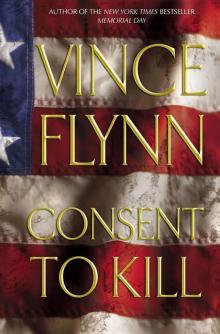 Consent to Kill
Consent to Kill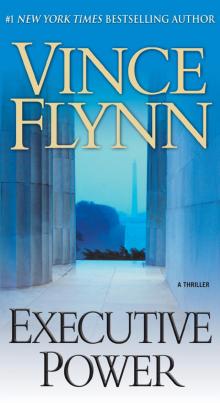 Executive Power
Executive Power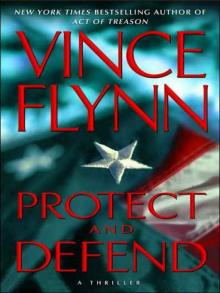 Protect and Defend
Protect and Defend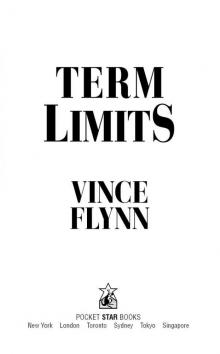 Term Limits
Term Limits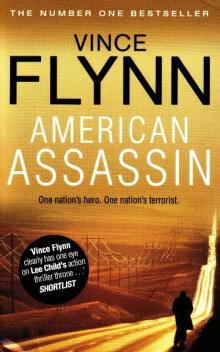 American Assassin
American Assassin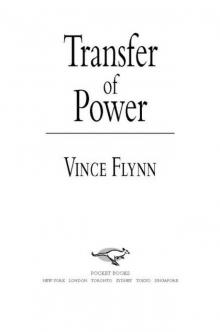 Transfer of Power
Transfer of Power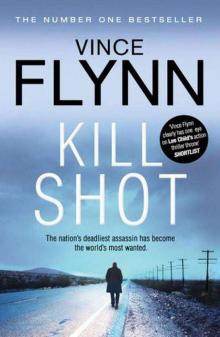 Kill Shot
Kill Shot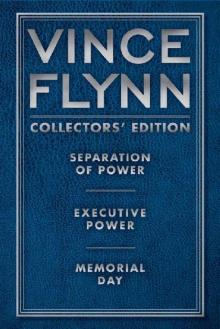 Vince Flynn Collectors' Edition 2
Vince Flynn Collectors' Edition 2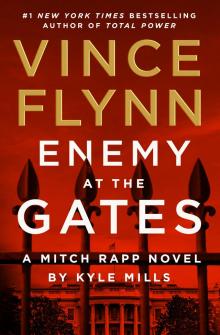 Enemy at the Gates
Enemy at the Gates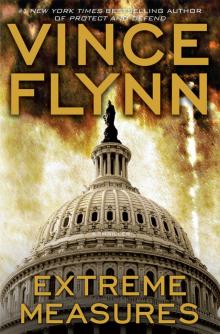 Extreme Measures
Extreme Measures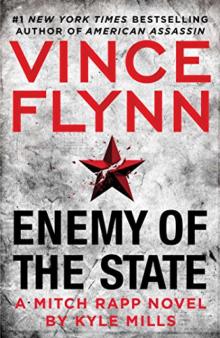 Enemy of the State
Enemy of the State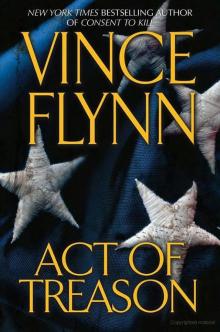 Act of Treason
Act of Treason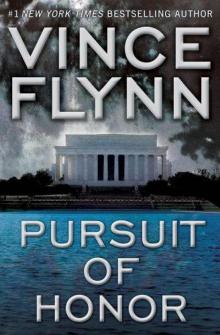 Pursuit of Honor
Pursuit of Honor The Survivor
The Survivor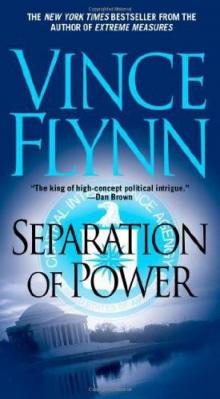 Separation of Power
Separation of Power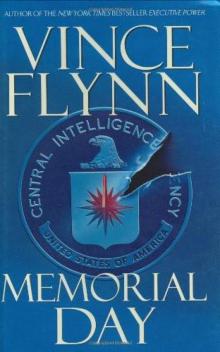 Memorial Day
Memorial Day The Last Man
The Last Man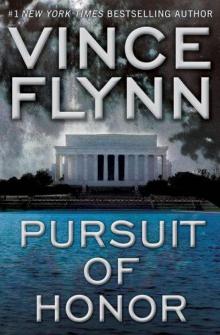 Pursuit of Honor_A Thriller
Pursuit of Honor_A Thriller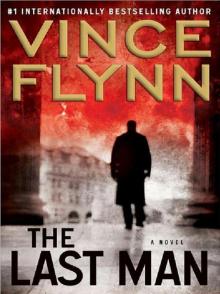 Mitch Rapp 13 - The Last Man
Mitch Rapp 13 - The Last Man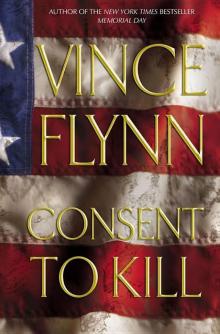 Consent to Kill:
Consent to Kill: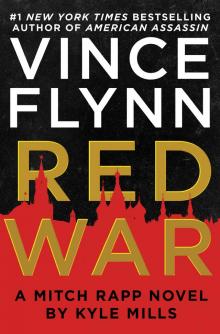 Red War
Red War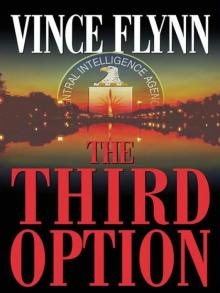 Mitch Rapp 02 - The Third Option
Mitch Rapp 02 - The Third Option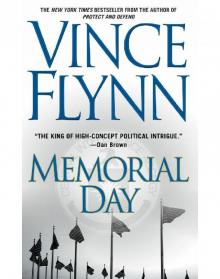 Mitch Rapp 05 - Memorial Day
Mitch Rapp 05 - Memorial Day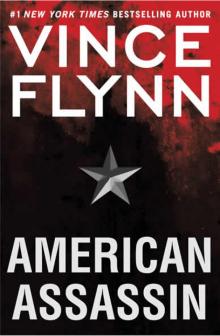 Mitch Rapp 11 - American Assassin
Mitch Rapp 11 - American Assassin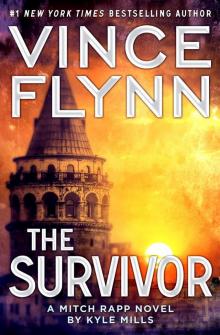 Mitch Rapp 14 - The Survivor
Mitch Rapp 14 - The Survivor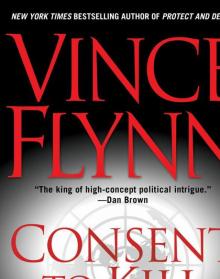 Mitch Rapp 06 - Consent to Kill
Mitch Rapp 06 - Consent to Kill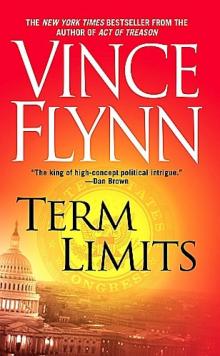 Term Limits mr-1
Term Limits mr-1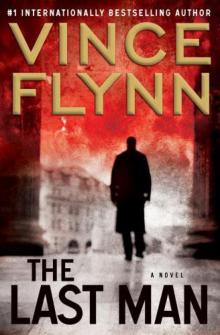 The Last Man mr-13
The Last Man mr-13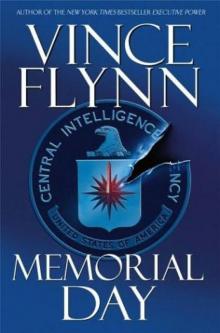 Memorial Day mr-5
Memorial Day mr-5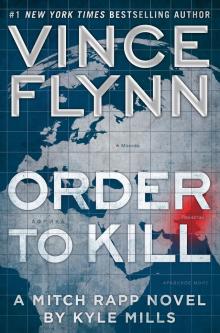 Order to Kill
Order to Kill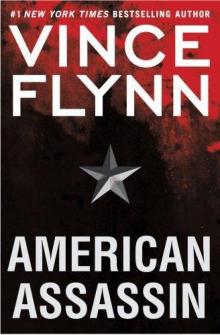 American Assassin: A Thriller
American Assassin: A Thriller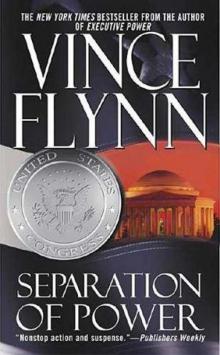 Separation of Power mr-3
Separation of Power mr-3